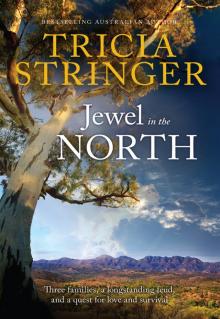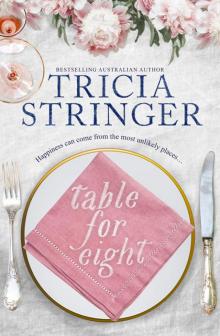- Home
- Tricia Stringer
Dust on the Horizon Page 2
Dust on the Horizon Read online
Page 2
Jack’s eyes refocused on Ethel. “What was his name?”
“What does it matter?” She slapped the table. “I told ya he’s dead.”
“But he had a wife, perhaps other children.”
“His wife didn’t want to know about you. She was a lady and he kept your mother and his bastard offspring a secret from her.”
Once more Jack leapt up. Ethel cowered back but he was around the table with one hand over her mouth and the other at her neck before she could get up.
“What was his name?” he hissed in her ear.
Ethel’s eyes bulged. He lifted his fingers away from her mouth and leaned in closer.
“Wiltshire,” she gasped. “His name was Septimus Wiltshire.”
Two
Henry Wiltshire stepped off the verandah and smiled up at the newly painted sign, Hawker General Trader & Forwarding Agent. He had wanted his name on the shop front but his mother had insisted on Hawker, the name of the town which in turn had been named after well-known grazier and member of parliament George Charles Hawker. The shop name had been a sticking point but Harriet had a large share of money invested in the enterprise so he’d let her have her way on this.
Over two hundred and fifty miles from Adelaide, Hawker had been proclaimed on the first of July the previous year and was surveyed on a pronounced bend in the railway line which was to extend north-west. The original intention had been to build only a railway station but Henry had great expectations for Hawker already. The town would become a major service centre for both the railway and the pastoralists and farmers who took up land all around it and his shop and services would be in great demand.
The sun beat down on his hatless head as he looked left and then right. There was no-one in sight. Nothing but dust moved along the road. None of the wagons that usually rolled past to and from the train station, and even the constant sawing and hammering from the building across the road had ceased.
It was a surprising lull in a town where constant movement of wagons, teamsters and camel trains was the norm. The distant stations Henry had only heard of, with names such as Wilpena, Holowiliena and Arkaba, made use of the rail that extended to Hawker and was to continue further. The town itself was being constructed on a flat dusty plain but in the distance to the north a huge mountain range rose into the sky. It had been named Flinders Ranges. Today its grey heights shimmered in the heat haze, a huge barrier to the nothingness beyond. A trickle of sweat slithered down Henry’s back. It really did seem like he was at the end of the world but it was here he would make his mark.
He took a crisp white handkerchief from his pocket, patted the back of his neck then went back to the shade of the verandah roof. From there he slid a sideways glance across the empty space next to his shop, to the wooden structure that housed his opposition. Not a soul stirred there either. Henry’s stone establishment was a much better building than Garrat’s. People would flock in for his superior goods when things picked up. He tucked the handkerchief back in his pocket and brushed down his dark suit, determined to keep up an appearance in spite of the late summer heat
He opened the door to his shop. A bell tinkled but otherwise there was no sound. Henry frowned, pulled out his fob watch and checked the time, then he shut the door firmly which produced another sharper tingle from the bell. There was a movement from behind the heavy velvet curtain separating the shop from the living quarters at the back.
His pretty young wife walked unhurriedly to the counter. “Oh, it’s only you, Henry,” she said.
“I hope you will be more prompt when we have customers, Catherine.” He looked pointedly at his watch.
“Of course, Henry.” She smiled at him and fanned herself with her hand. “But in this heat no-one wants to go shopping.”
Henry put away his watch. Her smile always charmed him. She was right, but he needed her to help him if they were to build a strong business in this new community.
“If you’re staying in now, I’ll go back to my sewing.”
Henry watched as she stepped back behind the curtain. Catherine came from a wealthy family of strong religious faith. She was an appropriate partner for someone of Henry’s standing and he had been both pleased and surprised when she had consented to be his wife.
Soon after their marriage they had made the journey from Adelaide, by train, to the new township of Hawker. Henry smiled at the thought of the large sum of money the father of a fourth daughter had been prepared to pay to get her off his hands. His new father-in-law had been very generous but there had been quite a to-do when Henry had announced where they would be living.
Town was a grand word for the straggle of makeshift premises people lived in and did business from but Hawker was just starting out and Henry’s was only one of the new permanent buildings recently erected or in the process of being built.
He had come to the town last year with money to bid for land. He’d had to go as high as £100. His mother had been worried but he had convinced her he’d secured the best site. It was in a prime position facing the railway, and close to the station. Henry had conducted his business from a temporary dwelling while overseeing the building of his premises.
Hawker was the town of the future. Henry knew all the farmers and pastoralists would need quality goods and someone to sell wool and grain on their behalf and who knew what else in a town that was just starting out. Times could be fickle on the land and when they couldn’t pay with money he was prepared to give them credit. He looked out the window across the dusty road to the flat brown terrain that stretched to the distant ranges. There was barely any bush let alone trees like those that had dotted the creeks they’d crossed on the journey from Adelaide.
Henry gave a brief thought to the capital of the state of South Australia. The original plan had been to build a business then sell it, using the profits to start a shop in Adelaide. This was what his mother and Catherine’s parents believed but since moving to Hawker and discovering the potential here, he was full of optimism. Not only was he going to build a shopping empire, but he was planning to acquire land, lots of land. Their parents would all be happy once they saw how well he would provide for his wife and their future family.
Catherine sat back in the chair and undid the top button of her high-necked blouse. She picked up her handiwork but instead of stitching she used it to fan herself. She hated the heat. The heat was why she’d been slow to respond to the bell. She had heard the first tinkle but had been fumbling to do up her buttons. Henry was very particular that they should present a decorous picture to their customers.
When they’d first moved in to the tiny accommodation behind the shop she hadn’t liked it at all. Not that she dared say anything to Henry. Then last night he had surprised her with a promise to build her a grand home once their business was established, a place that would befit their status and acknowledge their prosperity. She’d wondered at that. It made their life here sound more permanent and yet Henry had said they would only be in Hawker for a few years until they had enough money to set up a fine business in Adelaide like his mother’s.
She sighed and looked around her little parlour. It was the room that led directly to the shop and was the only place Henry had to conduct his business. She had to have it prepared at all times in case he needed to use it.
Their two comfortable chairs were squeezed into one corner where she was sitting now. Under the window was their small dining table. There was room for the two of them but if they had guests they would have to rearrange the room and move the table to accommodate them. Not that it was likely they would entertain in the near future. Henry did not feel there were many people of their social standing in the district and few women came to the shop.
A large dresser filled one wall. It contained all the beautiful china and glass they had been given for wedding presents. A chiming clock, all the way from Germany, sat on top. It had belonged to his mother. Beside it was a small picture of Harriet. She glared out at Catherine. Harriet was not
an easy woman to like. Catherine was sure she didn’t live up to her mother-in-law’s expectations of a suitable wife for Henry. She turned away from the prying eyes.
On the wall opposite the window was Henry’s desk where he did his paperwork and conducted his forwarding business and next to it was a small cabinet where he kept an assortment of ointments and pills in little bottles and jars. His mother hadn’t wanted him to sell them. Catherine had overhead the conversation between mother and son. It had surprised Catherine to learn her mother-in-law had once travelled the land in a wagon selling goods. There was nothing about Harriet’s manner that suggested she’d ever lived such a basic existence. Evidently Henry’s father had run into a bit of trouble with some of the pills he’d sold and Harriet hadn’t wanted her son to jeopardise his new business. Henry thought people in the isolated town would welcome some basic medicinal assistance. They had compromised by keeping the pills and ointments in the living room and not having them on show in the shop. Henry sold them discreetly.
Above his desk hung a beautifully framed portrait of them on their wedding day. Henry was not usually extravagant but he had thought it fitting they should have the photograph to mark the occasion.
Beside that was the door into their bedroom. Catherine felt the heat rise in her cheeks. They had been married for five months now but she still could not get used to having to share her bed with Henry. Her mother had explained to her the relations he would expect of his wife but Catherine had still found his attentions vulgar.
Some nights once the lamp was out Henry would cover her mouth with a long sloppy kiss until she thought she would not be able to breathe. At the same time he would squeeze her breasts tightly and press his body hard against her. Then he would pull up her nightgown and plunge into her recklessly for a few minutes, moaning loudly. Just as suddenly as he had begun, he would stop, flop onto his back and go to sleep. It was the only time Catherine ever saw him look untidy. The heat and dust of their new home only added to her distaste. Thankfully Henry did not approach her in this way very often.
On the back wall was the door through to the tiny kitchen and washroom. Catherine could not tolerate going out there until she had to. The wood stove raised the temperature unbearably during the day. She rarely felt like eating at midday but Henry always wanted his meals on time. He was happy with cold meat and pickles for his lunch but liked a hot meal at night. Catherine dreaded the thought of cooking the fatty meat hanging in the kitchen safe. Just lately even the smell of it made her nauseous. The sudden tune from the clock made her jump. Henry would be expecting his luncheon in fifteen minutes.
A loaded wagon rolled past outside, drawing Henry’s gaze to the window. He was about to put out his Closed for Midday Meal sign but he would remain open if he had customers. He crossed to the window and peered out at the wagon, which had pulled up further along the road in front of the railway station. A man jumped down and brushed at his clothes sending up a cloud of dust. Probably making a delivery.
Henry dismissed the man as of no consequence then remained fixed to the spot as he saw bundles moving in the back of the wagon, taking the shape of children. Suddenly a black man appeared from the other side of the wagon. He was wearing a battered hat like the other man but the clothes on the Aborigine were much too loose and hung from his lean frame. Henry watched in astonishment as together the two men lifted down five children, three white and two black. The oldest Aboriginal child was a girl by the look of her clothes and she hefted the smallest white child to her hip.
“Well I never,” Henry muttered.
The group huddled together listening to something the white man was saying. Henry scanned the wagon again expecting a woman to appear from the load as the children had but there was no sign of an adult female. Just as well, the kind of woman who would produce these children should be kept out of sight of polite society.
He glanced behind him in case Catherine should suddenly appear. He had hoped there would be a few more women in the town by now but after another dry season, trade was slow and the town hadn’t boomed quite as quickly as he had expected.
The tall man in charge of the group outside bent and brushed a hand over the fair curls of the young boy beside him. Maybe this man was one of the farmers still clinging to the land. When Henry had made his first trip to Hawker, he’d crossed the Willochra Plains where he’d heard about farmers raising bumper wheat crops in magnificent chocolate soil. All he’d seen were downcast men with ragtag families barely hanging onto land that was dust as far as the eye could see. That was over a year ago and things had only got worse for the farmers since then. He read the defeat in their eyes when they came to his shop and he’d been astute enough to acquire any goods and chattels they’d wanted to sell that were still worth anything. Just last week he’d acquired a piece of land at what he believed was a mere pittance of what it would be worth again in the future. Times would improve again, he was sure of it.
The group in the street split up. The tall white man strode towards the railway station and the Aborigine was leading the children towards Henry’s shop.
Henry let out a low growl. “Oh no you don’t.”
He opened the door a crack, slid his arm out to attach the Closed sign then firmly shut the door and drew the bolt. He wasn’t fussed about whose money he took but from the look of this lot they had little and he wasn’t giving credit to a black man. Mr Garrat could serve them in his little general store. There was some custom Henry wasn’t prepared to accept.
The clock in the parlour chimed and he took out his watch again, twelve midday exactly. He replaced the watch, brushed his hand down his lapels and made his way to the parlour. All thoughts of the rabble outside were dismissed as he anticipated the meal ahead and the appointments with pastoralists he had booked for later in the afternoon.
Catherine had run out of jobs to do in the shop and had welcomed the tinkle of the bell signalling customers. Now, from her position behind the counter, she tried to keep the smile from her lips as she watched the young native girl stick out her hip and heft the small child higher. The little girl in her arms was obviously heavy but she wouldn’t put the child down and, to add to her load, on her other side she clasped the hand of another little girl. The neatly clothed dark man had removed his hat and stood just inside the door. He didn’t make eye contact with Catherine but murmured the occasional instruction to the two older boys who were also part of the group but only looked to be about five or six.
What a collection they were. The two boys were about the same height but one was fair and the other as black as the night. The native girl was the tallest and obviously the oldest of all the children. She kept her eyes lowered but Catherine couldn’t help but stare at her glossy black hair that fell in tight curls to her shoulders. Her skin was also very dark; a striking contrast to the two little girls in her charge.
Catherine glanced behind her where she could hear the murmur of voices coming from the parlour. Thank goodness Henry hadn’t long started his meeting with his last appointment for the day. She knew he wouldn’t approve of the customers that had just filed into their shop but what he didn’t know wouldn’t hurt.
Unsure if the natives would understand her, Catherine addressed the white boy. “Can I help you?” she said.
He snapped his clear blue eyes towards her and opened his mouth then closed it again.
“They need hats.”
The native girl spoke so softly Catherine barely heard her.
“What kind?” Catherine turned to the girl.
“Father said I could choose my own, Mary.” The white boy finally found his voice.
“They all need hats.” Mary’s English was stilted, a little louder this time. “And William has to pick something broad and sturdy.” She sent a hard look in the young boy’s direction then looked back at the floor.
William opened his mouth. There was a shuffle of feet from the man at the door and once again the boy closed his mouth without speaking.
&
nbsp; Catherine really didn’t know what to make of this strange little family. She wondered if the man at the door could be father to them all and if so, did he have two wives? She felt heat flush her cheeks at the thought.
“We can pay.” Mary lifted her dark gaze to Catherine as if daring her to say otherwise.
Catherine clasped her hands together tightly, then released them. It was none of her business how this family came to be, but the shop was hers to run. Henry had made it quite clear he wanted her to take charge when he was not available and she was very keen to do so. It was pleasing to have something to do other than manage their tiny house and good to have people in here after a very quiet week. And one thing she did have was an assortment of hats. Certainly some for the older children although she wasn’t sure about the youngest. Maybe they could improvise.
“They’re over here.” Catherine stepped purposefully around the counter and made for the wooden shelves that lined the side wall.
Henry had been aware of the sound of chattering voices as he’d finalised his business with the man sitting opposite him. He was pleased there were customers in his shop and hoped they were spending up big, although the commissions he’d made this afternoon more than made up for lack of sales in his shop.
He stood and shook the hand of the tall pastoralist who’d just sold a large consignment of wool. Henry had inspected the samples Joseph Baker had brought in and if the rest was as good they both stood to make a lot of money. Wool prices were on the rise again and while wheat farmers were doing it hard, those pastoralists who’d managed to survive the droughts, wild dogs and grasshopper plagues of the last few years could look forward to some better times.
“Your wife hasn’t travelled with you today, Mr Baker?”
“It’s a long journey. She stayed at home with our youngest child.”
“You are most fortunate. I hope that my wife and I will be so blessed in the near future.”

 The Model Wife
The Model Wife Right As Rain
Right As Rain Something in the Wine
Something in the Wine Between the Vines
Between the Vines Dust on the Horizon
Dust on the Horizon Jewel In the North
Jewel In the North Riverboat Point
Riverboat Point Heart of the Country
Heart of the Country Queen of the Road
Queen of the Road A Chance of Stormy Weather
A Chance of Stormy Weather Table For Eight
Table For Eight